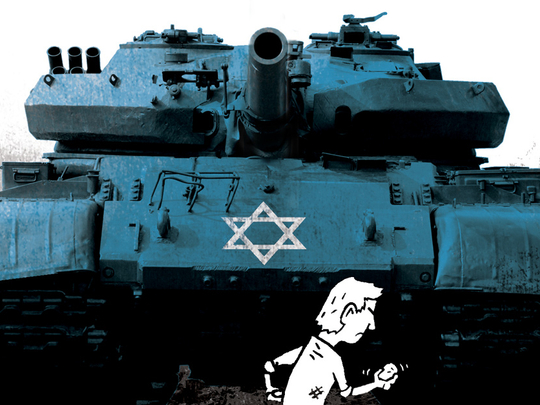
In one of his most important statements, the 16th century Italian thinker Niccolo Machiavelli observes: “For, in truth, there is no sure way of holding [a province] other than by destroying it.” This is exactly what Israel is doing to Gaza, for a month now, and the death toll is approaching 2,000, following the resumption of Israeli attacks on Friday after a brief truce.
What is missing here is reading what history has taught us. When people see that life and death is equal to them and there is nothing to lose, they will fight till they die. Even a cat, when it is cornered, will fight back, however strong the attacker might be. Humans are the same. In the past six years, Israel has launched three wars against Gaza. Each of them end with a truce, which is soon broken, and bloodshed starts again. This time, the war has gone on the longest, and the death toll has been the highest.
Every sane person must conclude that the balance of power is drastically in favour of Israel. But Gaza has plenty of humans ready to die, as death is much more preferable for many of them than the degrading life in a cage, deprived of any movement outside the tiny Strip, high unemployment, lack of clean water, electricity, and even cement to build their houses or medicines to treat patients.
Although Israel withdrew from Gaza in 2005, it started a blockade hardly seen in recent history. Almost two million people live in 360sq km of land, which represents only 1.33 per cent of historical Palestine. It has been blockaded through land and sea by Israel. Its border with Egypt has been closed for most of the time in recent months for political and security reasons.
It’s hard to know who started this round of violence. Both parties blamed the other. But both of them had reasons to start the fighting. The Israelis were alarmed by the recent reconciliation between Hamas and Fatah and the formation of the national unity government between the two. Israel considers Hamas a “terrorist group” aiming to destroy Israel. So they don’t wish the reconciliation to go ahead. The siege is hitting Hamas hard, despite the accord with the Palestinian National Authority, which refuses to pay the salaries of the Hamas fighters, and only pays for civilian workers. So despite the accord, Hamas finds itself in a very critical situation. Hamas was falsely accused by Israel earlier of kidnapping and killing three Jewish colonists in the West bank.
The conditions for a clash were there, both wanted a motive, and events gave it to them.
For almost four weeks now, the bombardments over Gaza haven’t really stopped. Almost 2,000 have been killed on the Palestinian side in front of world TV cameras; the world has been watching massacres, hundreds of buildings being destroyed, and rockets being fired towards Israel. And more than 60 Israeli soldiers have been killed. The tragedy is that there are no gains; it is a lose-lose situation.
Hamas position is a tragic one from many angles. First, the ordinary Gaza citizen blames Hamas for taking a hard line, with no obvious and tangible results for its struggle, time and again. The support for Hamas was dwindling, as recent surveys taken only weeks before the latest war showed. Gaza’s population sees Hamas conditions for ceasefire as impossible: lifting the siege, release of Hamas prisoners, and at the same time keeping Hamas weapons intact. Hamas is facing a deadlock in its relations with the only Arab neighbour, Egypt.
The new Egyptian authorities see Hamas as the Palestinian branch of the Muslim Brotherhood. The Brotherhood had cordial relations with Hamas when they were in power in Egypt. Now, Hamas is accused of actively aiding the unrest in Egypt. Add to that their refusal of Egyptian efforts at a ceasefire. Meanwhile, other parts of the Arab world — Syria, Iraq, Libya and many others — are embroiled in their domestic problems.
For the first time in decades, the Palestinian issue is not the number one issue in the Arab world and this was reflected in the media, especially social media. A war of words of sorts has broken out between two mainstreams of Arab public opinion — one camp is of those supporting Hamas, and accusing Arab nations, and especially leaders of being “cowards” and “letting down the Palestinians” and branding those who criticise Hamas as “Arab Zionists”. The second camp, blames Hamas for being malicious and irresponsible, and choosing the worst time regionally and internationally to engage militarily with Israel for their own ends, at the expense of innocent lives, knowing the might of the Israeli military machine.
Hamas propaganda is inflaming the whole scene, they claim heroism and glory, which to the ordinary Arab citizen’s ear is music, after decades of frustration and hopelessness. Political infighting is waged between Hamas and PNA. It is an old rivalry at the expense of precious Palestinian lives. The world has tried and failed to limit the appalling casualties. Meanwhile the bloodshed continues, a situation which even Machiavelli did not face in his time.
Mohammad AlRumaihi is a professor of political sociology at Kuwait University. You can follow him on Twitter at www.twitter.com/@rumaihi42









